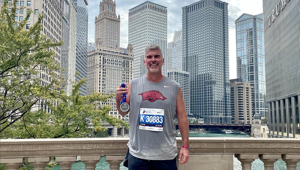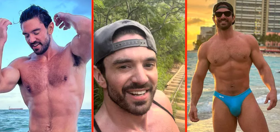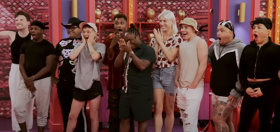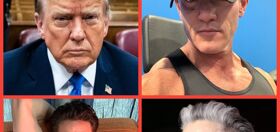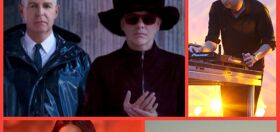
The W Hotel Hollywood, situated at the historic intersection of Hollywood & Vine, thumps with activity under crystal chandeliers and the silent gaze of movie star portraits. The lobby bleeds glamour, and Nelson Lassiter blends right in. Dressed in a black leather jacket, hat, and with dark eyes and a perfect smile, he looks like he just walked off a movie set.
We met up with Lassiter to discuss his new series Single Record, now streaming on Dekoo and Revry. Created, written, and co-directed by Lassiter, the show follows the career of an up-and-coming hip-hop artist named Aaron (also played by Lassiter). As Aaron rests on the cusp of stardom, he begins to feel a powerful attraction to Harmon (Kyle Axman), his musical collaborator. When the two have a passionate encounter, Aaron has to face the possibility his newfound attraction could derail his career.
In a quiet coffee bar of the W, the two of us sat down to talk about the show, his influences, and his thoughts on lingering homophobia in the entertainment world.
It’s hard not to think of Empire watching this. It has similar themes, though without the sort of Godfather crime angle. What made you want to do a show about a gay hip hop artist?
How about we take this to the next level?
Our newsletter is like a refreshing cocktail (or mocktail) of LGBTQ+ entertainment and pop culture, served up with a side of eye-candy.
This actually preceded Empire. The idea was that I wanted to create something that goes beyond fame and shows that these people are working people. They hustle just as hard as anyone else, and they all have their motivations. When you’re so driven down a certain path, and when you’re so motivated to make certain things happen, and then, along the way, a realization happens that throws a wrench into everything you’ve been working for, what happens? When this realization happens, is it even a wrench? What is it? So it’s sort of showing how people react when things happen that take them out of their comfort zone. Everyone reacts differently, but more importantly, everyone’s actions affect someone else in some way. So, for example in the series, what Aaron does are all things he feels he needs to do, but that has an impact on [the other characters]. I really wanted to create something that shows how a situation affects not just one person, but the people around them. I thought that was very important.
I know you’ve said that you really wanted to examine a culture of masculinity and homophobia within hip-hop, which is something we’re hearing a lot about in our cultural conversation at the moment. What is the root of homophobia in hip hop, and why does it persist?
For me, I think in my experience the root comes from the idea of being a man, especially within the black community. There’s a lot of emphasis on what it means to be a man: taking care of a family, taking care of the kids. You know, there’s a lot of unnecessary pressure put on us, that people grow up believing they need to be this kind of way, and that anything that doesn’t fall in line with that idea of being a man is considered weak or being a sissy. It’s interesting because that translates into hip-hop easily just because—especially if you think about rap battling. The easiest way to get a crowd to react is to undercut a rapper’s masculinity. If a rapper’s up there and his bars aren’t that good and he doesn’t have a comeback, it’s like, Ooh, he’s a bitch!
[Laughter]
But yeah, I think it just stems from black culture in the United States. I also think that religion has an element to play, just because African-Americans are predominantly Christian. Even if they don’t practice, those norms and values trickle in. Over time, these situations are exacerbated. No one challenges them, and they just become the norm. When something becomes the norm, it’s just that much harder to change it. It’s hard to exist outside the norm when you want to feel like you belong.
That opens up the larger question—showbiz, in general, has a lot of that pressure to conform for commercial reasons. It’s the idea that I need to be this because I’ve worked so hard. It’s a fear of failure, which was something I found very relatable in the characters.
That was one of the really important things I wanted. I wanted Aaron to feel like he was alone in his discovery because the feeling of isolation can drive you to do some crazy things. You get so deep into your head that you don’t know if things are up or down. I remember when I was in college and I was going through my own issues trying to reconcile and cope with my own sexuality, the paranoia in my head, just wondering how I’m going to get through it or how I can change myself. It’s one of those things where you may internalize all these different emotions and fears, and the way you express them are very different. So [in the show] Aaron pretending that he wrote all the music by himself without collaborating, that’s just his way of saying, This is what I need to do, because if I say I collaborated, what else will they think? That’s just how irrational your brain is. So I really wanted to play with that.

The initial scenes where Aaron connects with Harmon have a palpable sexual tension, and the scene of their initial encounter feels very natural.
I wanted their entire dynamic to be as natural as possible. Both of them are two people who are, to some degree, afraid. I didn’t want it to be cheesy. We have hundreds of gay movies from gay directors that are either super sexed up, or just barely getting there. I wanted to show a real interaction between two people who are confused and not sure how to deal with these feelings. Not everything is an instant fantasy romance. When you’re in that kind of situation, you’re going to question everything. And when it’s something you’re afraid of and don’t understand, your reaction is to push. But deep down inside, you’re getting pushed the other way. At the end of the day, if you’re going against your feelings and the current you’re going to lose.
Obviously, this is a personal project for you. You wrote you co-directed, and you also play the Aaron in the series. Did you write the part for yourself?
No. All of the characters are based on various elements of me and my life. The easiest way to create someone is to take different parts of yourself since we’re such complex creatures. A friend [told me] that Maxine [the record label exec] sounds like me when I’m angry.
[Laughter]
And I was like, “What? She’s not an angry person.” But I understood what he meant. All of the characters are based on different elements of me and the experiences I’ve had. So, for example, Shai [Aaron’s wannabe rapper brother, who suggests cutting can “cure” homosexuality] is actually based off of my father, because when I came out to him, those were his exact words.
Oh my gosh.
[Nelson laughs]
That’s heavy.
And Shai is one of those people who’s trying to do his own thing and use Aaron to his benefit, but that’s also similar to how my father was as well. He’s out doing his own thing, but at the same time, you want to have a relationship. You want to make it work. But sometimes when you have your own motivation, and you going through your own stuff, sometimes it just doesn’t connect.
And you write the music.
There is a lot, isn’t there?
[Laughter]
What’s your background, in music or drama?
I started writing music back in 7th grade. This is really funny: So I went to a private school, an all-boys school outside Philadelphia. And at the time, I was really into gangsta rap. So I was like the preppiest of people wanting to be a gangsta rapper. I would go home and listen to Beanie Sigel and Freeway. In hindsight, I was like a seven-year-old rapping about bullets and I didn’t know how to tie a tie.
But yeah, I started in 7th grade and evolved over time. Music has always been a love of mine. As I got into college, I realized I just wanted to create something that leaves an impact. That eventually evolved into filmmaking. So this was the perfect project to combine these two artistic styles that I had. I definitely wanted a gay, African-American story that focuses on one of the biggest musical phenomenons in the culture, hip-hop.

What for you is harder? Writing music or writing drama?
I always say, “I hate writing, but I write.”
I think more than anything, I love the concept of creating something. I love listening to music and writing something. Even when I’m writing scripts or outlines I have music playing in the background. I just love creating the piece. With music, I love writing it, recording it and just having it. When it comes to film and TV, of course, you want to have the final product, but I think I enjoy the actual concept and scripting phase because that’s when you start pulling the world together and creating your own universe. Knowing that your universe will eventually have outside people living in it is pretty exciting. My favorite moment was when I got the script done and did the first table read with the cast.
Did you write the songs first or while you were writing the script?
It was a mix. “Philly on Fire” I wrote before. Then “Young Lovers” was actually inspired as I was writing. I was like these people are dealing with emotions they’re not sure how to handle. We’ve all been through experiences when we were not able to deal with emotions. We probably pushed people away or treated them wrong. So the song is one of those things. It’s about I’m now older, and I want to treat you better. It’s about missed opportunities.
Within the queer community, we hear a lot about the down-low, the “DL.” I’m not sure if that’s a community.
[Laughter]
Group, call it.
It’s something that we talk about a lot within the community, which is really frustrating. It also seems to be a bigger issue for men in the African-American community; I believe that’s where the expression comes from.
Yes.

Why do you think, in an era where queer people of all kinds are more welcome and visible than ever, does that persist?
A lot of it has to do with just the pressures of hypermasculinity in the black community. I hate to generalize, but when you have a certain part of the population that comes from single mothers, there’s going to be that longing for a father figure. Your mother is going to instil in you the idea of what a man should be. And let’s say you have a father telling you the idea of what a man should be. If everyone is saying “a man should be this and this” and anything that’s related to a woman makes you less of a man, then you’re going to have that culturally in your mind. Eventually, the idea of liking another man—to the black community, that’s not a thing a man does.
And that can affect self-image.
So you don’t want people to know that. You don’t want to feel less than what you believe you are. This is just my interpretation, but I think that there’s always been an emphasis on father figures in the black community. Always. And putting all those unrealistic pressures out there contributes to the problem. But I don’t necessarily see it changing because even if black people started viewing the way they viewed men—gay men—that religious element is still depressing any kind of positive change. I’m not saying that is never going to change, but it’s a process.
Reesa [Aaron’s sometime girlfriend] has an interesting line. She refers to getting sexually harassed and accepting it as part of the job. She’s almost proud of it. That fits with the overall theme of the show of winning at all costs.
The best way to describe it is by playing the game. Everyone in some shape or form plays the game. As a black man, I know that there are lots of barriers to entry to this industry just because of opportunities. I know a lot of this industry runs on connections, and if you don’t come from a family that has those connections it’s more difficult. I understand that as a black man there are a lot of things, systematically, to make it harder to succeed—not impossible, but harder to succeed. With that, I realize that these are the cards stacked against me. I need to figure out what to do to get what I want. It’s kind of like poker: Everyone has a hand, some people have a better hand than others, but it’s how you play the game that decides who wins. Reesa knows that this is the way she’s being treated, and it would be great if she could change it. But she’s not going into the industry like a new fawn going into the woods. She’s going in knowing there are creepers, there’s this, there’s that, and [prepared] to deal with it. She’s mentally prepared that this stuff could happen.
She expects it.
Exactly. They know what they’re up against, and they’re ready for it. Aaron knows what he’s up against. All of them know what they’re up against, but are they bad people?
The show doesn’t pass judgment on its characters, but there’s no way around the question. The audience has to address it.
Exactly.

You’ve talked a bit about your folks. Have they seen the show?
Not yet.
Do they know about the show?
Yes. The real question is do they know how to use the internet.
[Laughter]
My mom is one of those people who finds websites only through search windows. She doesn’t know how to type in an address.
How do they feel about it?
My mom—she’s just like, “Do what you were meant to do.” It took her a long time to get to that point. But yeah, she knows what I want to do, and she’s very supportive. Before I dove into film and television I was an analyst, and I was miserable. When I told her I was quitting and wanted to make movies, she said, “I’m proud that figured out what you want to do.” Then she goes, “By the way, I have a friend down here in Georgia you should meet the next time you’re down.”
Your mom was trying to set you up on a date?
Yeah. And I was like fishing for more. So…she knows. She hasn’t seen it yet. But I really don’t think she [would object].
You mention your father and his reaction to your coming out to him as inspiration for the scene where Shai suggests self-mutilation to Aaron as a cure for his sexuality…
That’s also true.
Oh my gosh, that’s true!?
Yeah, my father suggested that.
Oh my…ok, so…I…
[Laughter]
Ok, so I don’t know how that’s supposed to work exactly.
The idea is that if you associate gay thoughts with pain, your body doesn’t want to feel pain so it will connect those thoughts with pain.
That’s really upsetting. So hasn’t seen the show yet either?
He’s aware of it. I think there may be some reticence on his part just because of the subject matter. For him, a gay black man is all kinds of sin. So for him to watch a show about a gay black man that’s played by his son who is a gay black man, that’s like double sin.
Will there be Season 2?
I’ve gotten that question several times. The main thread that I want to keep is that everyone’s actions affect everyone and the domino effect.
So we’ll see.
Single Record streams on Dekoo & Revry. The soundtrack will also have a release on iTunes later this month, date pending.




